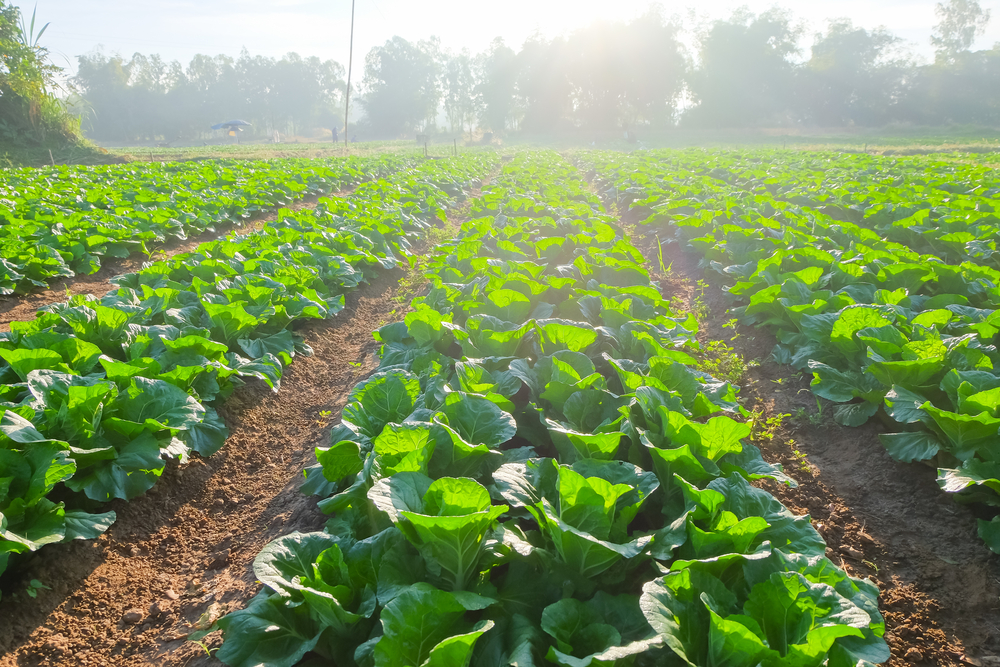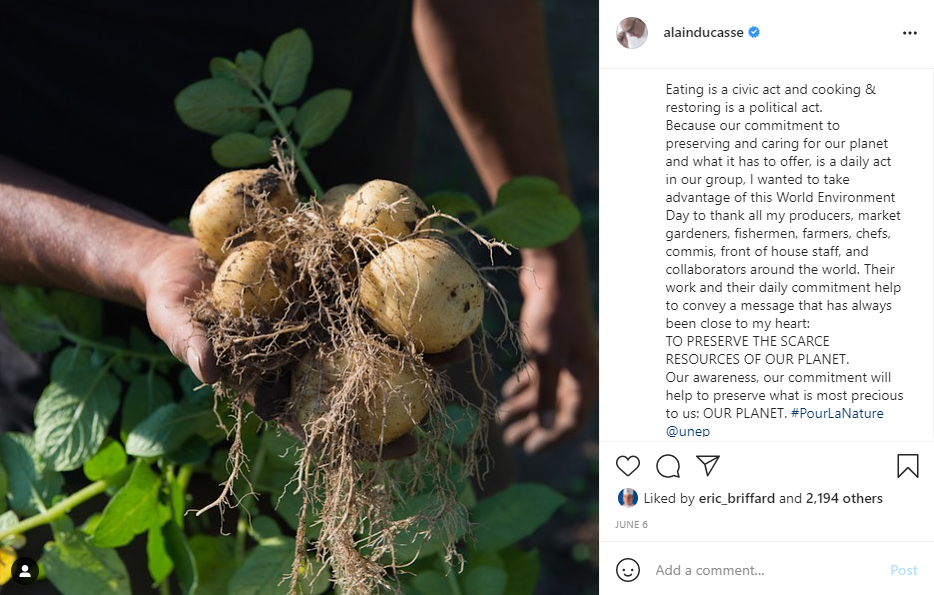
Le Cordon Bleu Adelaide announces new three-day training model
Le Cordon Bleu Adelaide is excited to announce a major shift in the way its Vocational Education and Training (VET) programs are delivered. In 2026, students ...

When preparing to cook a meal, are you aware of where the ingredients have come from, how they were grown or the process from being harvested through to arriving on your plate?
French epicurean Jean Anthelme Brillat-Savarin famously defined gastronomy as the study of human nourishment, of ‘all that relates to man as a feeding animal’[1]. In 1825, Brillat-Savarin saw gastronomy as a chapter of natural history, physics, chemistry, cookery, commerce and political economy. On 18 June every year, Sustainable Gastronomy Day still celebrates gastronomy as a cultural expression of the natural and cultural diversity of the world.
The United Nations’ Sustainable Gastronomy Day raises awareness of how important responsible practices are when it comes to food production and consumption. The event promotes practices that can be continued into the future without being harmful to the environment and our health, whilst celebrating seasonal ingredients and preserving wildlife and culinary traditions. It is also the opportunity to look at some of the drivers of change trying to bring about sustainability in gastronomy through innovations, collaborative action, and promotion of responsible consumer behaviour. These agents of change are active along the entire food value chain, from producers, through chefs, food critics and home cooks, to consumers.
Across the globe, farms cover over 50 per cent of the land at the production level. This gives farmers a critical role in preserving habitats and protecting soil health and water quality. Moving goods through the different stages of the food value chain, and storing them, requires energy and resources. Production and distribution account for most of the environmental impact associated with the consumer sector, in particular greenhouse gas emissions. Reducing greenhouse gas emissions in the food supply chain is therefore a ta key measure for achieving sustainability targets, such as the United Nations’ Sustainable Development Goals[2].
Chefs are the key to a sustainable future of gastronomy, given their role in selecting products to prepare dishes, promoting innovative practices and taking responsible approaches to sourcing and cooking food. A radically innovative proposal is the move to note-by-note cooking, advocated by French physical chemist Hervé This[3]. This type of cooking builds dishes from pure compounds, like proteins and lipids, rather than meat, vegetables, and fruit. Beyond the unlimited possibilities that it offers compared to cooking with traditional ingredients, note-by-note cooking may also be a solution to sustainability challenges. Reducing the use of fruit in cooking, for example, would decrease the amount of water required for growing it and energy for transporting it.
There is also a rise in chefs promoting and leading by example with greener cooking and eating. Alain Ducasse, the first chef to have three restaurants awarded with three Michelin stars at the same time, has co-created a humanist gastronomy manifesto made up of of five articles articulating the rights and duties of all people in their relation to food. For example, article 2 of the manifesto describes the right for all to taste education and the corresponding duty to further educate their senses, learn and pass on this knowledge. In a related book, Manger est un acte citoyen (‘Eating as a political act’), Ducasse explains how the act of eating (i.e., eating certain products in certain ways) is the exercise of our power and choice to preserve or destroy our health and the planet.
Beyond the kitchen, food critics and guides are also influencing both positive change and negative environmental impact. Traditionally focused on quality, they have now taken an active role in promoting responsible practices. In 2020, Michelin introduced the Michelin Green Star in recognition of sustainable gastronomy in restaurants. However, the ongoing COVID-19 pandemic has also put the spotlight on takeaway food conveniences for their impact on the environment. The increased use of food delivery services, for all their benefits since the onset of the pandemic, has resulted in a significantly higher than usual generation of waste and high carbon footprint from transportation and packaging. Encouragingly, there is evidence that some food delivery services are moving to use recycled paper and participate in recycling programs for plastic packaging.
Finally, consumers increasingly seek high-quality, diverse, and safe foods. With population growth, demand for food is rising rapidly, and so is the associated impact on the environment. Consumer behaviour may influence businesses in adopting those practices which are more likely to attract and retain customers, including sustainable practices. However, changes in consumption behaviour are also critical to sustainable development. Movements aimed at changing our diets point to the resulting positive impact on both the environment and our health. This includes initiatives such as the promotion of sustainable healthy diets by the Food and Agriculture Organization or the call to reduce our consumption of animal products as advocated, for example, by the influential Australian philosopher Peter Singer[4].
Challenges, problems, and dilemmas relating to sustainability in gastronomy will arise in different ways along the food value chain. Le Cordon Bleu Australia brings this variety of perspectives to life in its courses and learning activities, with students being encouraged to approach sustainability from the chef’s, the supplier’s or the consumer’s point of view while applying best practice business frameworks and methodologies to develop contextualised, effective, and viable solutions. For example, in the context of an assessment on gastronomic tourism, students are asked to reflect on the impact of given business practices, research sustainable practices, and make recommendations for future development as trusted advisors.
A 2019 global survey showed that CEOs recognise that the broader business community’s response to the Sustainable Development Goals has not been sufficiently ambitious or effectively coordinated and that systemic change is needed for real progress[5]. This highlights the need for business leaders being able to operate and collaborate in complex, uncertain environments, i.e., where both the consequences of today’s actions and the needs and preferences of tomorrow are uncertain.
Le Cordon Bleu aims to produce hospitality leaders with the multidisciplinary skills, the breadth, and depth of knowledge required to tackle these issues and become agents of change for sustainable gastronomy. For all of us feeding animals, foodies or not, we can support this change by caring about our food: where it comes from, how it is grown and how it gets to our plates.
Anything we cannot do forever is by definition, unsustainable.
Sir David Attenborough
We thank Professor Alan-Bowen James, Executive Dean of Le Cordon Bleu Australia, for his comments on earlier drafts of this article.
[1] As defined in The Physiology of Taste or Meditations on Transcendental Gastronomy.
[2] For an overview of the 17 Sustainable Development Goals, see https://sdgs.un.org/goals.
[3] Hervé This has written a book on the subject: Note-by-note cooking: the future of food, published by Columbia University Press.
[4] See, for example, Peter Singer’s The ethics of what we eat.
[5] The 2019 United Nations Global Compact — Accenture Strategy CEO Study on Sustainability is available at: https://www.accenture.com/_acnmedia/PDF-109/Accenture-UNGC-CEO-Study.pdf#zoom=40.
Copyright © 2025 Le Cordon Bleu International B.V. All Rights Reserved.